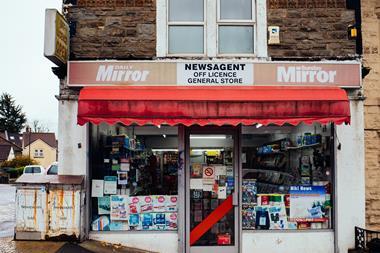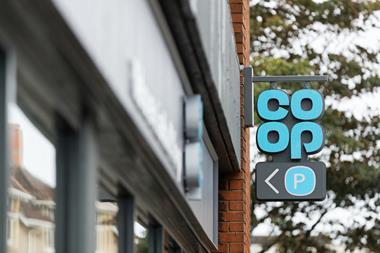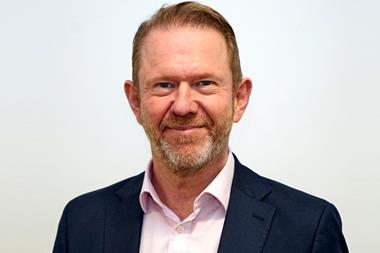This week, in his first interview since becoming ACS chairman, Angus Oughtred acknowledges the disquiet among the independents over the influence of the multiples, but insists both groups face exactly the same threats: growing levels of retail crime, below-cost selling, underage drinkers and the rising minimum wage.
That is why, he says, the ACS is stepping up its efforts win over disaffected members through a raft of initiatives, including forums, training programmes and acsdirect, its service specifically for independents.
Oughtred's day job is MD of The Grocer Top 50 chain Jacksons, and during his first visit to ACS head office in Farnborough since he became chairman, he's flanked by chief executive David Rae and public affairs and commercial manager James Lowman to discuss the organisation's submission on below-cost selling to the Competition Commission this month.
This week, the ACS put a draft version of its below-cost selling submission out to members, recommending the supermarket code of practice be strengthened to include a ban on below-cost selling and endorsing European and US models of practice.
Below-cost selling is an issue that affects everyone in the c-store sector, independent or multiple, argues the quietly spoken Yorkshireman, but it is not the biggest threat. "The critical issue for everyone is the growing demands for professionalism and customer service. Some say this has only been the case since the multiples entered the field, but I don't share that view at all. It's down to changing consumer demands. If you look at the benefits of ACS membership, one of them is the whole approach to best practice."
The organisation's push to reach out to all corners of the membership is beginning to pay off. Membership has grown from 1,000 to 4,000 members representing some 30,000 c-stores. Around 90% are independent. "Our communication with the independents is an area we've moved forward," says Oughtred, "but for logistical and single trader reasons, it's quite difficult to get the best practice message. A particular focus is to ensure our initiatives translate into more professional and successful independent businesses."
Specifically for independents
Many members do not realise, he says, that the ACS runs an NVQ-certificated ACS Lifelong Learning course for c-store staff or that it organises overseas study tours to countries like Japan and Scandinavia the latter country next month's tour. This was an initiative Oughtred introduced when he joined as events chairman in 1998 and there are many more aimed specifically at independents, he assures.
The ACS is also promoting is its acsdirect service, for instance, and trying to encourage more members to take part in its regular forums on the big issues. Around 70% of the organisation's time and resources are spent lobbying, and crime remains one of the biggest concerns. Oughtred says: "One of the problems is that security has been increased in city centres, pushing crime to the outskirts exactly the sort of neighbourhoods c-stores typically operate in. "
The ACS set up its retail crime forum last year and releases the first annual results of its quarterly crime survey shortly. It is also lobbying the Home Office for more money to tackle the issue in the UK's most deprived areas. "At the moment the fund is £15m and only available to the 10% most deprived areas. It's not enough," says Oughtred. "Our data suggests retailers are looking at an investment of over £20,000 each in security measures and that's before general fit-out."
Also high on the ACS agenda are issues like national insurance payments and the minimum wage and it continues to lobby the government for the introduction of ID cards to underpin a no-proof, no-sale regime for sales of alcohol and cigarettes.
"Licensing is another key area in terms of making sure the wider membership understands and is in a position to react to the new legislation," adds Oughtred, urging members to hang fire until the legislation comes out next month. "And we'll continue to do our behind the scenes work on issues like the climate change levy, animal by-products, packaging waste and tackling the hidden costs that affect the sector."
Oughtred has a hectic year ahead. But, surprisingly, he will not be the one banging on ministers' doors to convey the views of the c-store sector. That job along with all matters of strategy will continue to be the responsibility of chief executive David Rae and the rest of the executive team.
"That's how I see my role as taking the strategy as it is set and ensuring that it is really executed well," he explains.
The man behind the formidable success of Jacksons may prefer to defer to his chief executive. But make no mistake. Even as a back seat driver he will be pushing to get the ACS message out to the independents.
{{ANALYSIS }}
That is why, he says, the ACS is stepping up its efforts win over disaffected members through a raft of initiatives, including forums, training programmes and acsdirect, its service specifically for independents.
Oughtred's day job is MD of The Grocer Top 50 chain Jacksons, and during his first visit to ACS head office in Farnborough since he became chairman, he's flanked by chief executive David Rae and public affairs and commercial manager James Lowman to discuss the organisation's submission on below-cost selling to the Competition Commission this month.
This week, the ACS put a draft version of its below-cost selling submission out to members, recommending the supermarket code of practice be strengthened to include a ban on below-cost selling and endorsing European and US models of practice.
Below-cost selling is an issue that affects everyone in the c-store sector, independent or multiple, argues the quietly spoken Yorkshireman, but it is not the biggest threat. "The critical issue for everyone is the growing demands for professionalism and customer service. Some say this has only been the case since the multiples entered the field, but I don't share that view at all. It's down to changing consumer demands. If you look at the benefits of ACS membership, one of them is the whole approach to best practice."
The organisation's push to reach out to all corners of the membership is beginning to pay off. Membership has grown from 1,000 to 4,000 members representing some 30,000 c-stores. Around 90% are independent. "Our communication with the independents is an area we've moved forward," says Oughtred, "but for logistical and single trader reasons, it's quite difficult to get the best practice message. A particular focus is to ensure our initiatives translate into more professional and successful independent businesses."
Specifically for independents
Many members do not realise, he says, that the ACS runs an NVQ-certificated ACS Lifelong Learning course for c-store staff or that it organises overseas study tours to countries like Japan and Scandinavia the latter country next month's tour. This was an initiative Oughtred introduced when he joined as events chairman in 1998 and there are many more aimed specifically at independents, he assures.
The ACS is also promoting is its acsdirect service, for instance, and trying to encourage more members to take part in its regular forums on the big issues. Around 70% of the organisation's time and resources are spent lobbying, and crime remains one of the biggest concerns. Oughtred says: "One of the problems is that security has been increased in city centres, pushing crime to the outskirts exactly the sort of neighbourhoods c-stores typically operate in. "
The ACS set up its retail crime forum last year and releases the first annual results of its quarterly crime survey shortly. It is also lobbying the Home Office for more money to tackle the issue in the UK's most deprived areas. "At the moment the fund is £15m and only available to the 10% most deprived areas. It's not enough," says Oughtred. "Our data suggests retailers are looking at an investment of over £20,000 each in security measures and that's before general fit-out."
Also high on the ACS agenda are issues like national insurance payments and the minimum wage and it continues to lobby the government for the introduction of ID cards to underpin a no-proof, no-sale regime for sales of alcohol and cigarettes.
"Licensing is another key area in terms of making sure the wider membership understands and is in a position to react to the new legislation," adds Oughtred, urging members to hang fire until the legislation comes out next month. "And we'll continue to do our behind the scenes work on issues like the climate change levy, animal by-products, packaging waste and tackling the hidden costs that affect the sector."
Oughtred has a hectic year ahead. But, surprisingly, he will not be the one banging on ministers' doors to convey the views of the c-store sector. That job along with all matters of strategy will continue to be the responsibility of chief executive David Rae and the rest of the executive team.
"That's how I see my role as taking the strategy as it is set and ensuring that it is really executed well," he explains.
The man behind the formidable success of Jacksons may prefer to defer to his chief executive. But make no mistake. Even as a back seat driver he will be pushing to get the ACS message out to the independents.
{{ANALYSIS }}



















No comments yet